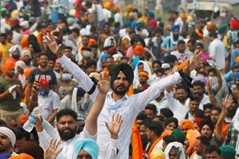India’s Farmers are Angry – Why?
Roshan Sharma

Currently, hundreds of thousands of farmers are protesting outside Delhi against new agriculture bills that were rushed through parliament. They say that these laws will deregulate the agriculture sector, expose them to the free market and destroy their livelihoods.
The Bills
There are 3 bills that were passed to abolish the current system where farmers sell their products at government-controlled markets or mandis at a guaranteed floor price. Instead, they will now be able to sell to private buyers (this is already possible in certain states). Private buyers can also now hoard essential produce, something that previously, only government agents had the privilege of doing. The current system is convoluted and a labyrinth of laws. The new bills should supposedly help the farmers by letting them sell outside of the mandis. The farmers are worried that the government will close the mandis and wholesale markets leaving them to be exploited by private players. The government has said that the MSP (minimum support price) will continue to exist but many farmers do not believe them. They think that this will be the final nail in the coffin for small farmers.
The Ruckus in the Rajya Sabha and the Decline of Democracy

Chaos erupted in the Rajya Sabha (the upper house of India’s Parliament) as the farming bills were passed through a voice vote despite requests from the opposition to pass it through a division vote. This happened as the deputy chair knew that the NDA (national democratic alliance), a right-wing coalition led by the BJP, wouldn’t be able to pass the bill through a division vote. The NDA also refused to have the bill scrutinised by a House select committee. This also happened with the Constitutional Amendment Bill (where Jammu and Kashmir’s special status was revoked).
The Suppression of Free Speech
There have been several allegations made of suppression of free speech against the Indian Government. The internet was shut down in certain parts of the protest amongst a vicious crackdown on free speech by Modi’s BJP government. Twitter was inundated with threats by the Indian Government saying that they would face legal action if they failed to take down several accounts of prominent journalists who were criticising the government. After Rihanna, a Barbadian singer, tweeted about the farmers protests, a flurry of Indian celebrities, including Sachin Tendulkar and a number of famous actors and actresses, posted nationalistic and pro BJP propaganda on their twitter accounts. This suppression of free speech has been a defining feature of Modi era India. If this decline of democracy continues, India may lose its title as the world’s largest democracy.